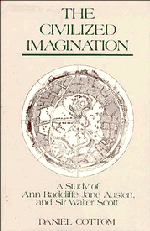Summary
In youth … there is a sort of freemasonry, which, without much conversation, teaches young persons to estimate each other's character, and places them at ease on the shortest acquaintance. It is only when taught deceit by the commerce of the world that we learn to shroud our character from observation, and to disguise our real sentiments from those with whom we are placed in communion.
– SIR WALTER SCOTT, The MonasteryIn all of sir walter scott's novels the difference between the modern world and the world of the past is defined by the difference between the rule of law and the rule of violence. At every period of history described in these works the progressive elements of civilization are distinguished from the anachronistic on the basis of their commitment to the increasing sublimation of violent conflict within formal regulations, especially the written regulations of law. In the modern world “the attorney is … a man of more importance than the lord of the manor” (I, xxii), and the modern attitude toward society is that represented by Mr. Pleydell in Guy Mannering as he explains why the faults that may be found in the legal system should not be unduly distressing:
“In civilised society law is the chimney through which all that smoke discharges itself that used to circulate through the whole house, and put every one's eyes out; no wonder, therefore, that the vent itself should sometimes get a little sooty.” (GM, 271)
- Type
- Chapter
- Information
- The Civilized ImaginationA Study of Ann Radcliffe, Jane Austen and Sir Walter Scott, pp. 171 - 192Publisher: Cambridge University PressPrint publication year: 1985

